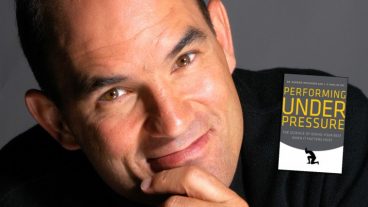From small disappointments to heartbreaking tragedies, unwanted change blindsides us and leaves us wondering what to do next. Todd Hirsch, Chief Economist at ATB Financial and author of Spiders in Space: Successfully Adapting to Unwanted Change, shares three lessons we can all use to conquer change instead of falling victim to it.
“Yah, there’s really no option here,” the vet told us. “Both her eyes will have to be removed. She has glaucoma and is probably suffering constant headaches.”
Puma, our little 12-year-old Boston Terrier, was already mostly blind, but we were still heartbroken at the news. Eyes removed? It seemed too horrible to think about. What will become of her? Will she just lie there in a heap, having to be hand-fed and carried everywhere, all wizened and tragic?
In fact, Puma’s story of adapting to change was entirely the opposite of what we had feared. She became an inspiration, offering lessons in resilience and how to adapt when life deals you a lousy hand.
Lesson #1: Be resourceful with what you have, not focused on what you’ve lost.
Already her primary sense, smell became an even more powerful tool for Puma. Hearing, too. She uses her nose more than ever to locate her toys, her water bowl, her younger canine sister, and she uses sound to determine when she’s approaching a wall. She doesn’t mope about, as a human might, asking “WHY ME? What good am I without my eyes?” No, dogs don’t focus on the loss, they just get on by using the tools they still have.
Lesson #2: Be curious and take risks.
It wouldn’t be truthful to suggest Puma is the same dog as before — she’s not. She can’t see. She bumps into chair legs, she hesitates before jumping off the couch, she steps carefully in new environments. But, she remains active and curious about her world. She takes risks, even if that means bumping into things. Sadly, humans often become paralyzed by a changed environment, terrified to act for fear of making a mistake. To be sure, Puma’s risks are calculated risks — she’s not tearing around the yard chasing squirrels anymore. But, she also hasn’t allowed herself to stop moving. She remains curious and active.
Lesson #3: Be kind and hospitable to everyone.
A few days after the surgery Puma was back at home adjusting to her new condition, and friends and family members were keen to visit. When there was a knock at the door, Puma picked herself up from her bed and walked gamely to the door (bumping and knocking into things as she went). She didn’t know who had come, but it didn’t matter. Someone had arrived! She extends the same kindness and friendliness that she has always possessed — maybe even more so now. For humans, we should be kind and hospitable all the time, not just when we’re undergoing change, but it’s more important than ever when we’re adapting to new circumstances. People will always be there to help, even if from unexpected places. Seeking and accepting help is a vital step in adapting.
Puma, as with all animals, is amazingly resilient. Animals can adapt to change remarkably well, and they offer us examples to follow. If one thing in life is certain, it’s that change will happen — and it may be sudden and unpleasant but by following the lessons of our four-legged friends, we can find inspiration and hope no matter the circumstances.
Todd Hirsch speaks about the Canadian economy, adapting to change as well as creativity, risk-taking, and embracing failure, all with his signature friendly and easy-to-understand style.
Interested in learning more about Todd and what he can bring to your next event? Email us at [email protected].




